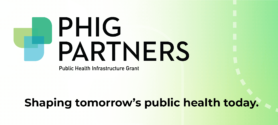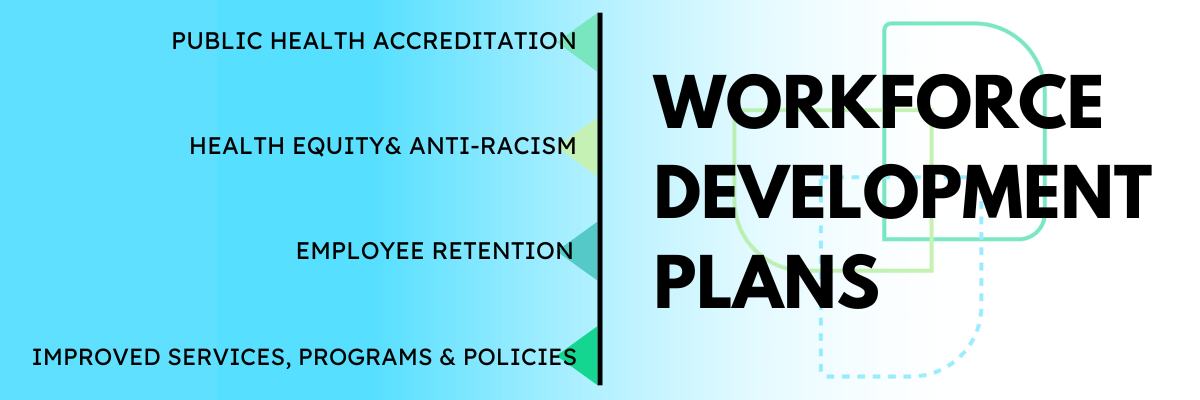From Accreditation to Action: Missouri & Milwaukee Health Departments Use Workforce Development Plans to Better Reflect & Serve Communities
- By: Chloe Lake
- Date
Missouri Department of Health and Senior Services and the City of Milwaukee Health Departments leverage Public Health Infrastructure Grant (PHIG) technical assistance to create customized workforce development plans aligned with Core Competencies for Public Health.
To deliver essential public health services well, health departments need staff equipped with the right skills and training for their roles. The Missouri Department of Health and Senior Services (MDHSS) and the City of Milwaukee Health Department (MHD) leveraged PHIG technical assistance to develop comprehensive workforce development plans that will empower their staff to serve their communities effectively and efficiently. These plans prioritize organizational goals, reflect employee needs and preferences, and adhere to the Core Competencies for Public Health Professionals. Workforce development plans not only allow any health departments to meet accreditation requirements, these plans will help MDHSS and MHD create a supportive work environment, improve employee retention, and maximize their investment in staff training.
While both health departments engaged with Public Health Foundation via requests through the PHIG technical assistance portal known as PHIVE, each department had specific goals: MDHSS sought to create a robust 5-year workforce development plan as part of their public health re-accreditation process, while MHD requested help creating a plan to support a diverse, representative, and anti-racist workforce.
Technical Assistance from Public Health Foundation
Public Health Foundation, a PHIG technical assistance provider and the organization responsible for the Core Competencies, worked side-by-side with MDHSS and MHD to:
- Sort jobs into key categories: PHF helped the health departments review all roles within the health department, identify those requiring similar skills, and categorize those jobs into six groups based on shared skill sets.
- Engage staff to prioritize competencies: Given that there are 56 Core Competencies spread across 8 domains, prioritization is necessary to create a realistic and time-bound plan. PHF supported health departments in facilitating virtual workshops with representatives from each job category to define and discuss the competencies. Staff representatives then used a voting process to prioritize the most essential competencies for their roles.
- Assess staff competencies & training preferences: PHF created competency assessments for all staff based on the prioritized list of competencies identified in step 2. This assessment not only gauged proficiency but also gathered preferences for training types and formats.
- Create a plan: PHF worked with health departments to synthesize all of this data into a workforce development plan that describes the types of training that employees need to be as effective as possible in their roles. PHF also provided guidance and recommendations on how to best implement and evaluate planned strategies and activities.
For most health departments, this process takes 3-6 months, and with PHF’s help, often requires only a few hours per week of time commitment from health department staff.
Key Outcomes
Missouri Department of Health and Senior Services
MDHSS’s plan reflects 3 main priorities, which emerged through the assessment and prioritization process:
MDHSS’s plan is marked by ongoing communication with new and existing staff using a variety of channels and strategies, including an intranet site devoted to workforce development, monthly town halls, and a focus on the plan and overall workforce development during new staff orientations.
Brenna Davidson, Operational Excellence Leader with MDHSS’s Office of Performance Management, noted the plan isn’t designed to just check an accreditation box, sharing, “We want our team members to understand: we’re doing this because we need to. It’s the right way to do our work to protect and promote the health of Missourians. Re-accreditation is just a by-product.”
City of Milwaukee Health Department
While MHD developed a workforce development plan with PHF in 2023, they were committed to better integrating strategies to build an anti-racist workforce. “Health Equity Skills” is one of the eight Core Competency domains, but MHD chose to add a ninth domain to explicitly focus on dismantling racism: Racial Justice Competencies, as described by the Public Health Training Center Network. Within that domain, they selected 3 priority competencies to include in their plan:

“Racism affects everything, so we have to be thorough in how we approach everything from hiring and training staff to developing agency policies to how we communicate with the public,” said Kiki Lezama, Director of Public Health Workforce Infrastructure, Policy, Innovation, and Equity with MHD. Lezama continued, “To dismantle racism, these racial justice competencies must be reflected in all we do as a health department, not just trainings, tasks or projects that explicitly focus on health equity.” Lezama also shared that MHD’s annual racial equity survey, which measures staff feelings of inclusion and belonging, as well as their familiarity and comfort with racial equity topics, will help the agency quantify their progress in this new domain.
Benefits of a Workforce Development Plan
Sonja Armbruster, a PHF Performance Management & Quality Improvement Consultant who worked with both Missouri and Milwaukee, explained why investing time in these plans is so beneficial. “There are thousands of online and in-person training opportunities. Given many options and limited time, agencies need clear plans to ensure that staff are investing their valuable time in the most valuable trainings for their role,” she said. “Agencies that invest in assessing their workforce needs, writing a plan to meet those needs, and following through on that plan will find that they make measurable progress.”
Amanda McCarty, a PHF Performance Improvement Consultant who also assisted both health departments, spoke to how these plans support community health, saying, “Health departments need to be able to ask, ‘Are we capable of delivering essential public health services to our communities? Do we have the right staff, with the right training to be effective?’ If not, we need a plan to make that happen.”
Further, investing in employee development has been shown to increase staff retention and employee satisfaction.1,2 McCarty shared, “A potential way to measure whether a workforce development plan is working is to see if turnover is decreasing.”
How Can Other Health Departments Replicate This?
PHF technical assistance, available via PHIVE request, is tailored to each agency’s needs, while offering expertise and lessons learned from helping other agencies. PHF will assist with competency assessments, prioritization of training opportunities, and creating frameworks for staff-identified needs and interests.
Beyond workforce development plans, PHF provides the following services.
Technical Assistance Opportunities:
- Accreditation Readiness (Domain 8 and 9)
- QI Culture Assessment
- QI Plan Development
- Development of PM and/or QI Council, support with initial meetings
- Development support for PM goals, objectives, and measures
- Workforce Competency Assessments
- Workforce Capacity Assessment, gap analysis, and prioritization
- Workforce Development Plan
- TRAIN Administrator Support
Training Opportunities:
- Performance Management Overview Training
- Development of a Performance Management System
- Quality Improvement Overview Training
- Quality Improvement Project Launch Training
- Developing & Supporting High Performing Teams
Related Resources:
Citations:
- LinkedIn Learning. (2024). Workplace learning report 2024. LinkedIn Learning. https://learning.linkedin.com/resources/workplace-learning-report
- Gallup. (2024). State of the Global Workplace: The Voice of the World’s Employees Research Summary. https://www.gallup.com/workplace/349484/state-of-the-global-workplace.aspx
This work is supported by funds made available from the Centers for Disease Control and Prevention (CDC) of the U.S. Department of Health and Human Services (HHS), National Center for STLT Public Health Infrastructure and Workforce, through OE22-2203: Strengthening U.S. Public Health Infrastructure, Workforce, and Data Systems grant. The contents are those of the author(s) and do not necessarily represent the official views of, nor an endorsement, by CDC/HHS, or the U.S. Government.




 Subscribe To Our Communications
Subscribe To Our Communications